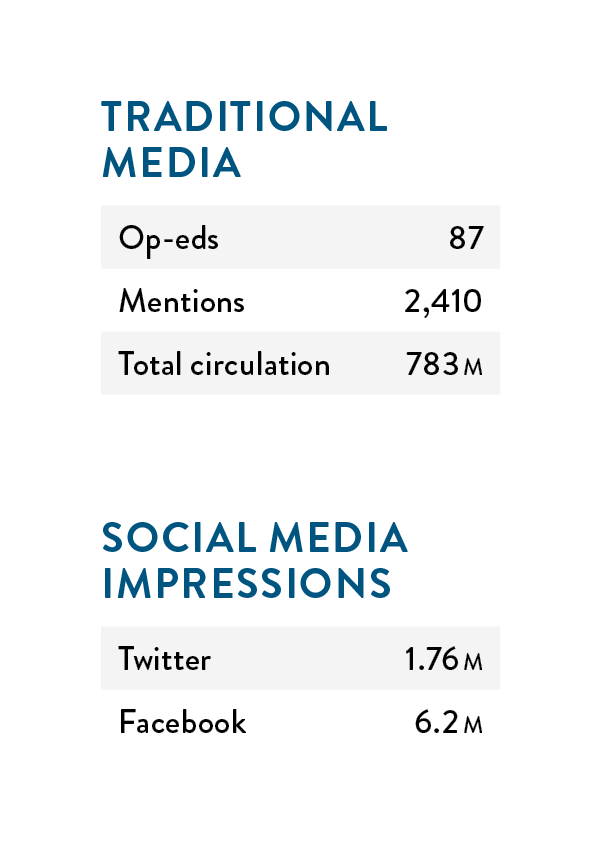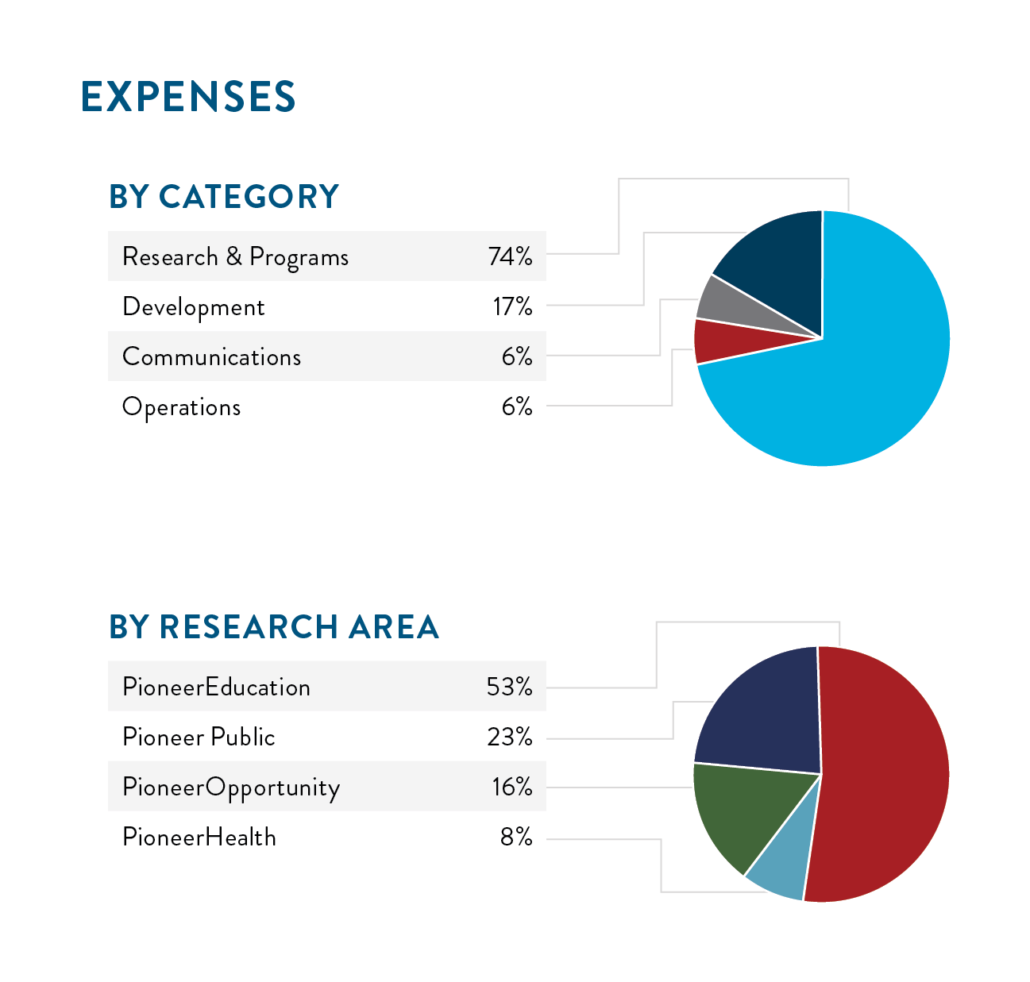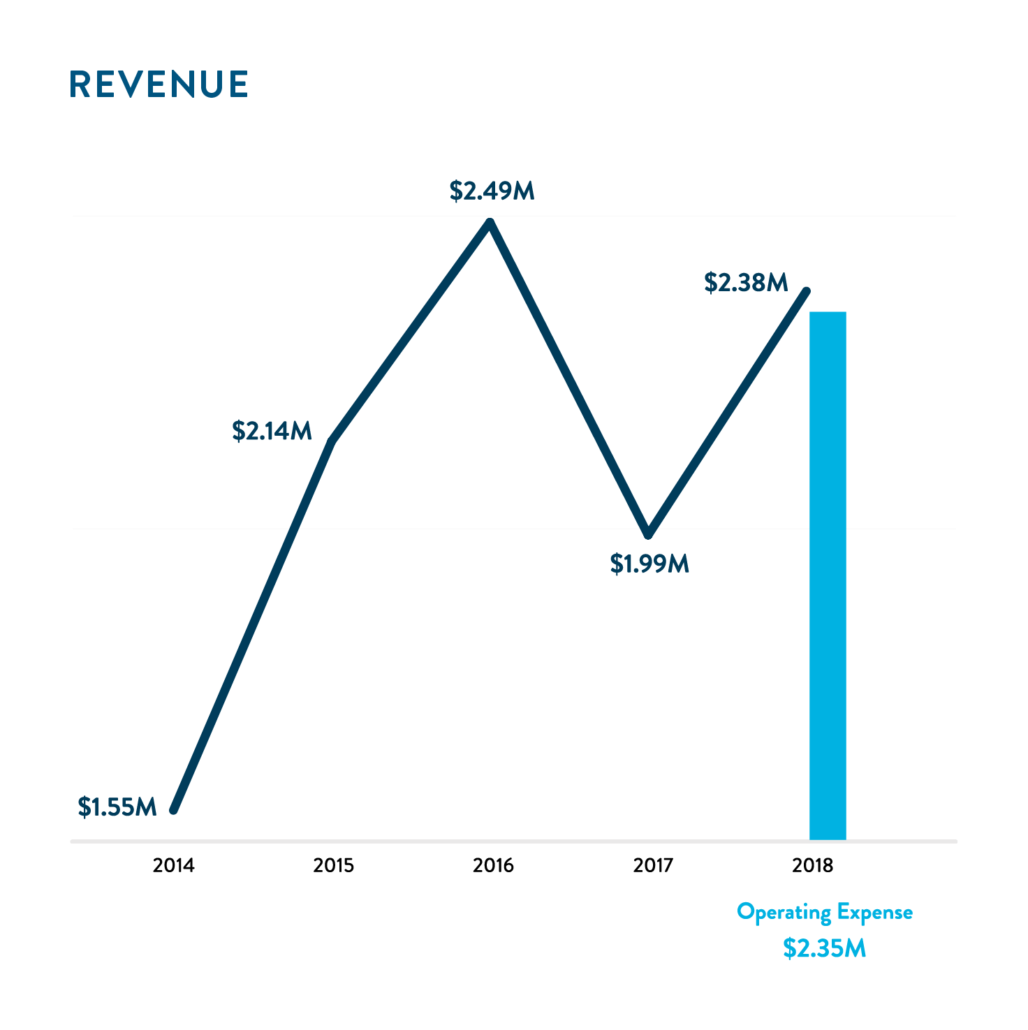Educational advancement has the power to transform lives, creating a ripple effect on an individual’s path to prosperity. That’s why Pioneer is committed to policy solutions that fulfill the promise of equal opportunity in K–12 classrooms, whether that means preserving Massachusetts’ nation-leading curriculum standards, holding school leaders accountable for results, or expanding the menu of options to lower income families so their children can gain a foothold on the ladder of success. Pioneer’s major initiatives in 2018 resulted in greater access to charter schools and other non-traditional models, broader public awareness of legal barriers to school choice, legislation requiring more emphasis on Civics instruction, and increased investment in career training programs.
Delivering a Variety of School Options
Pioneer Institute recognizes that no single education environment can serve the needs of all children. Parents deserve the chance to choose the academic program most responsive to their child’s individual abilities and challenges. For the hundreds of thousands of families who live in the state’s economically depressed communities, charter public schools have been a beacon of hope, helping low-income and minority children, and increasing numbers of children with special needs and language barriers, meet or exceed the academic performance of their more affluent suburban peers.
In New Bedford, Massachusetts, Pioneer’s targeted multimedia campaign helped open up nearly 500 additional charter school spots for families despite the fierce opposition of a mayor backed by special interests who nearly thwarted the expansion plans of a successful local charter school, Alma del Mar. In over a dozen op-eds placed in regional and statewide news outlets, three videos that earned over 50,000 views in the New Bedford area, and through a feature column Pioneer helped secure in The Wall Street Journal, Pioneer showed the stark contrast between Alma’s excellent student performance and the school district’s ranking among the fourth-lowest performing in the state. As a result of the added scrutiny, public outcry, and political pressure, policymakers engineered a compromise that allowed Alma to move forward with its expansion plans.
“Special interests have swarmed those disrupting the status quo — the vocational technical schools, charters, the state’s accountability agency, and others who brought change. The new commissioner has to bring urgency and an ability to rein in the department’s reform-blocking apparatchiks.”
– JIM STERGIOS, COMMONWEALTH MAGAZINE
Pioneer also continued its popular video series showcasing charter public schools across Massachusetts. Adding to its library of on-site interviews with school leaders and faculty in Lowell, Lawrence, Springfield, East Boston, Roxbury, and Chelsea, which garnered nearly 500,000 views in 2016, Pioneer produced new segments in Fall River, New Bedford, Plymouth, Marlborough, and Worcester, that have already earned over 300,000 views among parents in those locations. Pioneer’s video and social media promotion on charter schools has resulted in a dramatic increase in charter applications, 62% in Boston and 30% in Lawrence.
Another proven method of improving student outcomes for low-income minority students, primarily in Boston and Springfield, is the METCO program. In several reports, op-eds, videos, and radio and TV appearances since 2011, Pioneer has publicized data demonstrating the program’s high demand and success at boosting enrollees’ performance relative to their sending district peers. Following Pioneer’s campaign for expansion, legislators increased the program’s FY19 budget by $2.5 million.
Over the years, Pioneer has held many public forums and published research highlighting the improved student outcomes and high demand for the quality education provided at Catholic and Jewish day schools, an option more families would consider if not for legal barriers that present financial obstacles. Pioneer released a 30-minute documentary film last year profiling four families struggling to send their children to parochial schools in Massachusetts, Michigan and Georgia, where there are punitive anti-aid amendments that prevent parents from receiving tuition scholarships. The film, Big Sacrifices, Big Dreams, was viewed 1.1 million times and received 500,000 trailer views.
A Pioneer study revealed that these anti-aid amendments in Massachusetts have also been used as the state Department of Elementary and Secondary Education’s justification for depriving thousands of private and religious school students hundreds of millions of dollars’ worth of special education services that they are owed under federal law. The report received coverage in Politico, and leaders from Catholic and Jewish organizations are working with the U.S. Department of Education on a resolution.
While Catholic schools are rapidly closing their doors all across the country, declining by over 60% since 1965, one promising program, the Chicago-based Cristo Rey Network, is growing. Pioneer held an event, featuring Pope John Paul II biographer George Weigel, to release its new report highlighting this innovative model that provides largely low-income students with a college preparatory education combined with a work-study component to teach them job skills and defray tuition costs. Thirty-one schools have opened in 21 states and D.C., with eight more expected in 2020. After Weigel’s appearance at the Pioneer forum, he publicized the study on the Cristo Rey Network in his weekly column, “The Catholic Difference,” syndicated to 85 newspapers and magazines in seven countries.
A Pioneer report helped raise awareness about a little-known option for Massachusetts parents seeking alternatives to their local public school — the state’s inter-district choice program, which allows students to attend better schools in neighboring towns, spurring healthy competition among districts. Demand has grown steadily, from less than 1,000 students in 1992 to over 16,000 in 2017, and at its current pace, may exceed the program’s enrollment cap within the next five years. Report author Roger Hatch was interviewed on WGBH News radio, and the report received extensive coverage in The Cape Cod Times and The Springfield Republican. There is a state legislative effort to increase the program’s tuition cap.
Preserving High Standards
Since 2010, Pioneer has published more than 20 reports and the book, Drilling through the Core, Why Common Core is Bad for American Education, and made presentations in 33 states, leading the national movement for high-quality, state-based K–12 education standards. In 2018, Common Core-aligned national tests continue in less than a quarter of their original member states. After extensive Pioneer research and outreach to policymakers and editorial boards at the most influential news outlets across the Commonwealth, Bay State leaders rejected participation in the Common Core-aligned testing consortium in favor of an improved version of the state assessment known as MCAS. However, a Pioneer study revealed a growing performance gap between Massachusetts students in more advantaged schools, and those in the rest. National Assessment of Educational Progress test results for 4th-grade reading and 8th-grade math show that overall improvement has stalled in the last decade, while the percentage of students scoring in the top category has steadily increased.
In a report covered in Forbes, The Daily Caller, The Washington Examiner, Townhall, Breitbart News, and The Federalist, Pioneer partnered with Cato Institute to bring attention to the negative impact of Common Core on school choice programs, which are increasingly hamstrung by regulations that require private schools to adopt a single curriculum standards-based test as a condition for receiving public funding. Co-authors Neal McCluskey of Cato Institute, and Ted Rebarber of AccountabilityWorks presented findings, and Jamie Gass served as a panelist, at a Heritage Foundation forum in Washington, D.C. A Pioneer video featuring the co-authors generated over 15,000 views.
A well-informed citizenry is indispensable to a vibrant democracy. Over the past decade, Pioneer has been actively promoting K–12 history and civics instruction through public forums with noted scholars and bestselling authors, public polling, research, and the placement of dozens of opinion pieces highlighting historical figures, key moments, and government institutions that students should know about. Last year, Pioneer published a close analysis of Massachusetts’ proposed new History and Social Science Curriculum Framework. Authors David Randall, National Association of Scholars; Will Fitzhugh, The Concord Review, and Jane Robbins, the American Principles Project called on state leaders to restore the 2003 version, and illustrated that the new frameworks allotted too much time to protest movements at the expensive of comprehensive coverage of European and American history. They offered recommendations that would bolster Civics requirements.
Pioneer Distinguished Senior Fellow Tom Birmingham wrote op-eds in American Heritage and CommonWealth magazines warning about policymakers’ efforts to weaken Massachusetts’ nation-leading History education standards. Pioneer commissioned a public opinion survey by respected pollster David Paleologos showing that strong majorities of parents, history and social studies teachers, and legislators in Massachusetts support restoring passage of a U.S. History MCAS test as a high school graduation requirement. Jamie Gass appeared on WBUR’s RadioBoston to disseminate the poll results to a wider audience. In 2018, a statewide coalition drew on recommendations from Pioneer to pass new legislation on civics education that included protections for students with diverse points of view.
Op-eds by Jamie Gass covered the life of Civil Rights activist Fannie Lou Hamer, the accomplishments of Founding Father Thomas Jefferson, and Poland’s working class revolt against Communism, and appeared in national outlets including The Federalist, The Daily Caller, and regional newspapers across the state. Pioneer also released a video celebrating The Concord Review, now in its third decade, a journal that publishes exemplary history research by secondary students from around the globe.
“The key focus of previous academic standards was on America’s founding documents, state history, labor union history, the intent of which was to have the kids acquire a basic understanding of the major eras of American history. A lot of the things that they’ve added are really more current events rather than looking back 100 or 200 years to see how we got to where we are today.”
– JAMIE GASS, THE LOWELL SUN
Preparing for College & Careers
Massachusetts’ distinctive approach to improving its vocational-technical schools, stemming from its landmark 1993 education reform law, has focused on academic quality and accountability while providing first-rate training in the trades. As several Pioneer reports dating back over a decade, video promotion campaigns, and dozens of op-eds have demonstrated, these schools have become a national model, reporting increased demand, low dropout rates, and partnerships with businesses to help meet the skills shortage and strengthen the state’s economy.
After Pioneer’s efforts to underscore the efficacy of VTE, the Massachusetts Governor has committed over $50 million through the Skills Capital Grant program to increase these schools’ job-training offerings — the first such state investment in 35 years — and has expanded VTE enrollment by 3,000 spots.



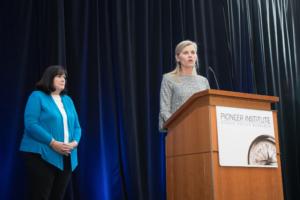





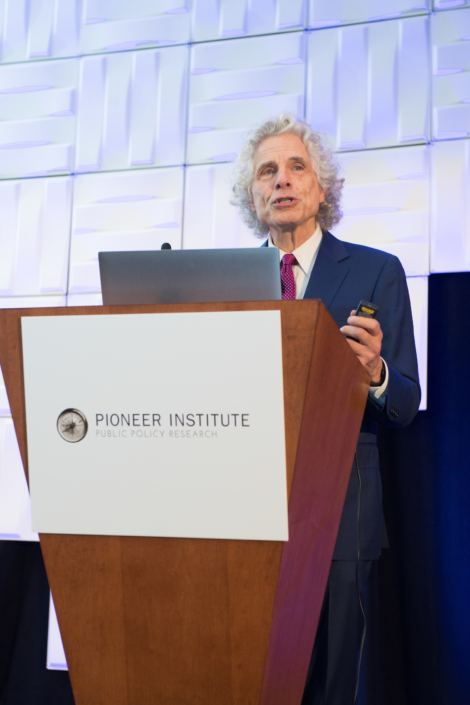



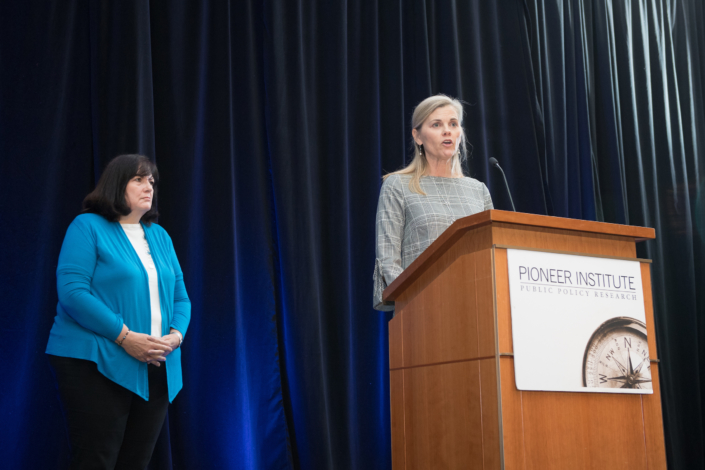

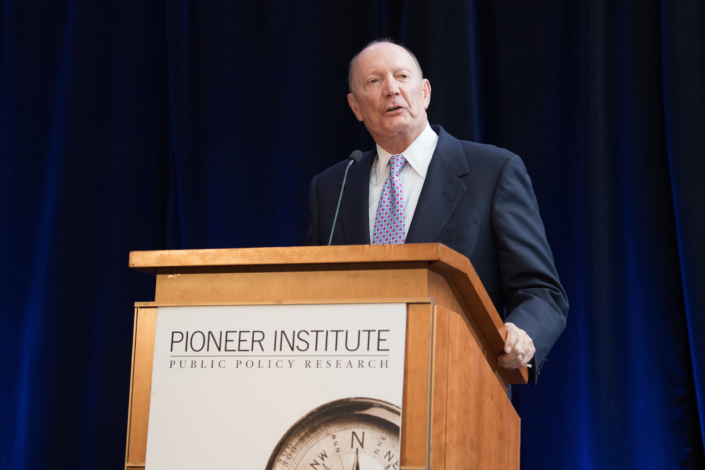





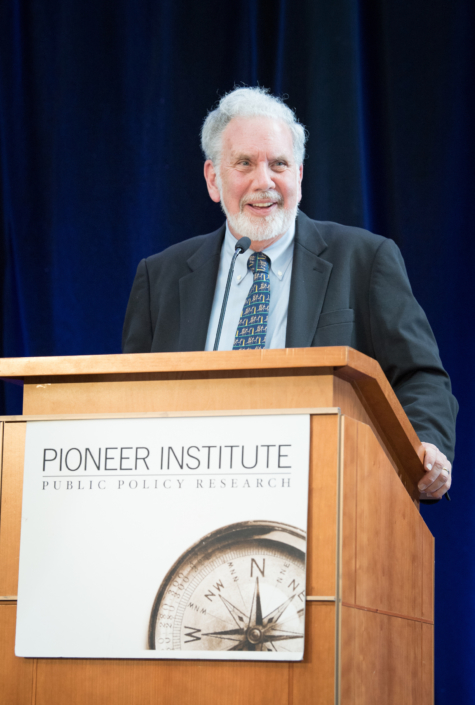
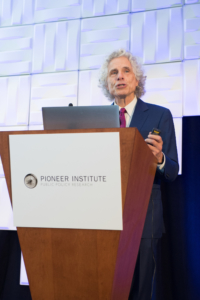 On December 4th, Pioneer celebrated the Institute’s 30th anniversary at the 2018 Lovett C. Peters Lecture. The keynote speaker was Dr. Steven Pinker, bestselling author and Johnstone Family Professor of Psychology at Harvard University. Dr. Pinker delivered a sweeping overview of the major societal advances—unimaginable not so long ago—that have improved our overall quality of life, from health and working conditions, to financial prosperity, intellectual abilities, happiness, and many other measurable indicators. Given today’s political and social climate, Dr. Pinker provided some much-needed perspective on humanity’s true condition.
On December 4th, Pioneer celebrated the Institute’s 30th anniversary at the 2018 Lovett C. Peters Lecture. The keynote speaker was Dr. Steven Pinker, bestselling author and Johnstone Family Professor of Psychology at Harvard University. Dr. Pinker delivered a sweeping overview of the major societal advances—unimaginable not so long ago—that have improved our overall quality of life, from health and working conditions, to financial prosperity, intellectual abilities, happiness, and many other measurable indicators. Given today’s political and social climate, Dr. Pinker provided some much-needed perspective on humanity’s true condition.